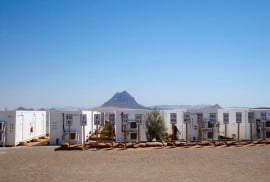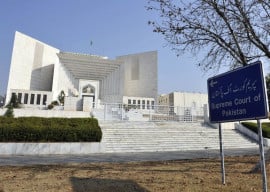
The Supreme Court on Wednesday observed that the $10 billion fine imposed on Pakistan by the International Court of Justice (ICJ) in the Reqo Diq case was a “nuclear bomb”, which could impact the country from anywhere in the world.
A five-judge larger bench, headed by Chief Justice of Pakistan Justice Umar Ata Bandial and comprising Justice Ijazul Ahsan, Justice Munib Akhtar, Justice Yahya Afridi, and Justice Justice Jamal Khan Mandokhail resumed the hearing on a presidential reference on the project.
President Arif Alvi, on the advice of Prime Minister Shehbaz Sharif, had filed the reference to seek the apex court’s opinion on the Reko Diq out-of-court settlement deal.
Additional Attorney General (AAG) Chaudhry Aamir Rehman contended that if the issue of relaxation of rules for international companies was mentioned in the previous agreement, the SC in 2013 would not have declared it null and void.
To this, Justice Munib noted that Reko Diq and other mining-related rules were under the domain of provinces.
“Can the federal government amend provincial laws?” the judge inquired.
CJP Bandial asked the AAG if the Balochistan government had relaxed mining rules for international investors.
The AAG replied that it had done so in the previous agreement.
The chief justice observed that a consultative body should be formed to monitor the matters related to the new pact.
He added that the Centre was investing Rs1 billion in the project but it had given the authority for it to the provincial government.
The AAG informed the court that the Reqo Diq project would be executed with efficiency and transparency.
To this, the chief justice noted that the level of transparency in our country could be gauged from the fact that many files were approved by the cabinet “without even opening them”.
Justice Yahya Afridi put forth the question that as international agreements were a matter of federation, could the provinces interfere in them.
The court noted that the previous agreement did not mention international companies.
It added that as the Balochistan government did not have the capacity to refine gold, the foreign company took advantage of that.
The top court had observed back then that Pakistan had signed better agreements in those days despite the unrest in neighbouring Afghanistan.
Amanullah Kanrani, the lawyer representing the Balochistan Bar Council, told the court that it should keep in view how much the country would benefit from the gold extracted from Reko Diq but the province would reap no fruits.
He added that Barrick Gold Corporation had a monopoly all over the world.
Justice Munib remarked that the penalty imposed on Pakistan by the ICJ in the Reqo Diq case was a “nuclear bomb”, which could impact the country from anywhere in the world.
CJP Bandial noted that the $10 billion fine did not involve a single province but the entire country would be affected by it.
The court later adjourned the hearing of reference till November 7.





















COMMENTS
Comments are moderated and generally will be posted if they are on-topic and not abusive.
For more information, please see our Comments FAQ